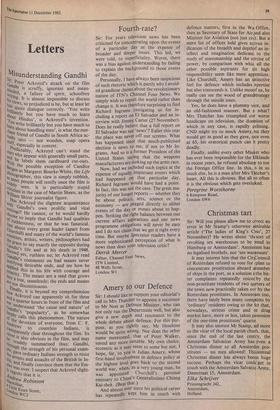Letters
Misunderstanding Gandhi
Sir: Peter Ackroyd's attack on the film ,a,nehi is scruffy, ignorant and mean- w-:;11c1. ed, a failure of spirit, schoolboy ;"tIng: It is almost impossible to discuss his h:_s views, so prejudiced is he, but at least let , b"" quote dialogue correctly. 'You write aiilliantlY but you have much to learn bout Hindus', is Ackroyd's invention. 1'4 write brilliantly but you have much to earn about handling men', is what the mer- tefiaut friend of Gandhi in South Africa ac- suta,,IlY says — not wooden, soap opera especially in context. st Predictably, Ackroyd can't stand the a ars who appear with generally small parts, vi!`l he labels them cardboard cut-outs. Ei With the possible exception of Candice Dhe,sreerl as Margaret Bourke-White, the Life "t°8rapher, this view is simply rubbish, w, ruost people will testify once the film is er,idelY seen. It is particularly stupid ;t,i,e,isrll in the case of Martin Sheen, as the Shirer journalist figure. aS Ackroyd the slightest acquaintance wit.n Gandhi's own prolific and vital ehritirigs? He cannot, or he would hardly of°°se to imply that Gandhi had qualities ruthlessness, or that he was fanatical. about every great leader (apart from se. urchin) and many of the world's famous ientists, artists, writers, philosophers had
grace to say exactly the opposite during
life and at his death in 1948. rewd yes, ruthless no; let Ackroyd read juandhi's comments on bad means never astirYing desirable ends, and see how he tOPlied this in his life with courage and joeutaeitY: The means are a seed that grows are° a tree, seamlessly; the ends and means
not discontinuous p .
ho InallY, it is beyond my comprehension anw Ackroyd can apparently sit for three riot! a quarter hours in front of the film and t understand 'the cause and nature' of lirnari,d, hi's 'popularity', as he somewhat Ty calls this phenomenon. The nature tae devotion of everyone, from C. F. 4;4Irews to countless Indians, is ea 4sParently clear throughout the film. Its beuse is also obvious in the film, and may thr„crudelY summarised thus: Gandhi, Dijugh the strength of his personal exam- th,' gave ordinary Indians strength to resist oia- arrests and assaults of the British in In- nit' and finally convince them that the Ern- e was over. I suspect that Ackroyd slight- regrets that it is. aticire W Robinson
4 .frnillan,
Lcicittle Essex Street, "13n WC2










































 Previous page
Previous page